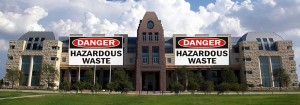The Most Toxic Place in Frisco? City Hall
 There have been times and places when Frisco's official municipal insularity has undoubtedly worked in its favor. It's focused, "go-our-own-way" style is probably a big reason why the city has carved such a high-profile niche among DFW suburbs.
There have been times and places when Frisco's official municipal insularity has undoubtedly worked in its favor. It's focused, "go-our-own-way" style is probably a big reason why the city has carved such a high-profile niche among DFW suburbs.
But the last two years of wrestling with the Exide lead smelter has revealed all of the vices of such an approach when it comes to environmental hazards and public health.
Given the rapidity of events, it's easy to forget that only two years ago, the same city officials now in charge of pursuing a clean-up of the Exide site were lauding the smelter as a valuable member of the local business establishment and trying to find ways to keep it operating. Having a lead smelter spewing tons of toxic air pollution near the High School in the middle of town was OK with these folks. They'd overlooked decades of state and federal environmental violations by the smelter. They overlooked the destruction of a city water treatment plant by the smelter. Hey, Exide employed 100 people. And "what could the city do anyway?"
Only the intervention of citizens, campaigning with the well-known idea of the city being able amortize the facility out of existence, forced the city to finally confront the incongruity of the smelter's operation with its 2013 Frisco surroundings.
Frisco parents didn't sign their mortgages in blood to gain entry in a prized school district only to have their kids IQ suffer because of an obsolete lead smelter. To their credit city officials sensed that the curtain had been pulled back too far on their pretense to go on. They did a 180 and got the smelter out of town. But they did it the Frisco Way: the city manager and city attorney wrote a secret, complicated, $45 buy-out agreement with Exide that was passed by the Council without any public hearing and no debate.
After the unanimous vote, when someone asked Frisco Councilman John Keating if he'd support a community oversight committee to make sure we got the best clean-up of he smelter site, his response was "We're it." And just like that, it was supposed to all go away. Containment.
But lead smelters are messy places, especially outlaw operations like the one Frisco hosted for so long. Especially when they operate decades before most of the regulations governing them now were implemented or enforced. They're hard to contain unless you know what you're doing. And nobody could tell Frisco it didn't know what it was doing. It was Frisco!
The city didn't feel any obligation to let its residents know how it would handle the clean-up, how extensive the clean-up would be, what kind of technologies or strategies might be used. Perhaps most importantly of all though, city officials never asked themselves or their constituents the most basic of planning questions, "What's going to happen to the Exide site?"
The City's de facto answer seems to be: a toxic waste dump. It appears to be fine with letting Exide hold on to the core of the smelter property, where all the worst contamination is, where tons and tons of lead waste are buried or piled or dumped, all uphill from Stewart Creek that still runs right through the site. So amidst all the million-dollar homes and exclusive shopping malls there will be this large toxic no-man's land with scary warning signs and the need for continued monitoring for decades. City officials meet any skepticism of this plan with a shrug of their shoulders. "What can the City do?" For a town with a reputation for being "can-do." Frisco City Hall has lacked the imagination to see anything but the need for an extensive cover-up – literally and figuratively – when it comes to the Exide situation.
Instead of dealing straight-on with the challenge, officials decided to play a game of misdirection by emphasizing what a great new regional park it was building…..directly downstream of the still-contaminated smelter site. But please, mention of any current or potential contamination problems at these presentations by any city official is strictly prohibited. It's just so uncouth to keep bringing that up.
If you lived outside the bubble of Frisco City Hall, you could see the absurdity in this strategy. Putting a park downstream of a dirty Exide site is like putting puppies on the rail at the end of a roller coaster ride. You're just waiting for disaster to strike.
And it turns out those city officials knew it too. They just didn't want to tell their residents.
Six months before they signed that complicated $45 million secret deal, officials were aware there was extensive contamination of the Grand Park area by Exide. Maybe that's one reason they wanted to keep the agreement secret.
We've been told by more than one engineer that the City had a responsibility to turn over that information to the EPA and state when it got the results in November 2011. Instead it just sat on it. How many Frisco children have been needlessly exposed to hazardous material in and around Stewart Creek in the intervening 18 months? How could any Frisco official in good conscience keep this kind of thing from the public?
It took another year and a half for the City to follow-up with its "visual survey" of the entire 5-mile course of Stewart Creek, from the smelter to Lake Lewisville. Then, instead of taking equipment with them on that trip up the Creek that would be able to identify lead waste and give you some idea about its toxicity, including stuff you couldn't necessarily see at first glance, it was merely a sightseeing affair where "suspected" slag and chips that were out in the open were inventoried.
However, even that expedition was enough to confirm that the Creek had been acting as a sluice for Exide waste into the Lake. The City had those results three months ago.
All of this information was known in early June when Frisco Unleaded and Downwinders released a small report on the threat to Frisco's Grand Park from the smelter site. We did it at one of those Council presentations about the park where all of its virtues are discussed, but none of its environmental problems.
Not one city official spoke to the contamination problems facing the park. And it was clear that most were furious at citizens for once again raining on their Grand Park parade. It's as if Frisco city officials really believe that if you just don't mention the Exide toxic waste problem out loud, it can't hurt you.
It's one thing to apply that kind of magical thinking in denying Open Records Act requests and fluffing-up park presentations, but when it infects your ability to protect public health, it becomes a more serious matter.
Not only has the city hid information about hazardous materials that it had a duty to make public. It's been caught trying to actually hide the hazardous materials. When a TCEQ inspector advises the city in 2012 that there's a new pile of battery chips that's washed up, the city's response is to cover it up with "geo-membrane fabric" – even when the TCEQ inspector says that's not going to be sufficient. They don't want to dig it up. They don't want to do more testing to see the extent of contamination. They don't want to actually remove it. They want to cover it up. That's the city's entire M.O. when it comes to Exide these days. And that's what must change.
Had the city been up front with its own residents in real time about the smelter contamination, there would have been no press in June about how the smelter will impact Grand Park. The public would have already known. There would have been no wave of coverage about these City reports and TCEQ memo all of this last week. It would have been out in the open already. By trying to hide information from the public the city only insures it will always be in a reactive mode and behind the curve. It automatically gives more power to curious citizens to write the narrative, as this past month has shown. When your residents are finding this stuff out from us, instead of the local government that insists it's got everything under control, it's a sure sign that they don't have every thing under control
So far, only Frisco Unleaded and Downwinders have offered anything like a long-term answer to the most important question – what's going to happen to the Exide site? And we're even on the planning department's payroll.
But the City Manager, City Attorney and Mayor would all rather drink lye than admit they've been wrong about this problem, or that Frisco Unleaded might have a good idea or two. It's the toxic mix of arrogance, lack of vision, and conflict of interest that's doing the most to poison Frisco right now. Exide's messy waste problem is only a symptom of this kind of mind-set. Before the definitive clean-up can happen at Exide, there's got to be one at City Hall.
